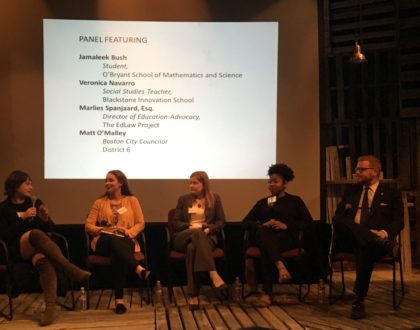Advocacy Committee Hosts Teach Us All

While Greater Boston is nationally recognized for its great schools, from pre-K to graduate programs, we are not immune to school segregation and education inequity. This was the cornerstone of the “Teach Us All Screening and Panel Discussion” on April 9th, 2018 at Lyric Stage in Boston. The YW Boston Advocacy Committee, in collaboration with the Youth Advocacy Foundation (YAF), hosted the screening and discussion to highlight how educational equity in 2018 traces back to school segregation before Brown v the Board of Education (1954).
Teach Us All (2017), a documentary directed by Sonia Lowman, focuses on three cities, Little Rock, New York City, and Los Angeles, to demonstrate the unique but similar disparities students face across the country. The central question is: “60 years later [after Brown v Board of Education], how far have we come – or not come – and where do we go from here?” Through this framing, the film posits that education inequity is among the most urgent civil rights issues today.
After the 80-minute film Samantha Colero, co-Executive Director of YAF, facilitated a conversation to put the themes in the film through a Boston-perspective. YW Boston and YAF were honored that four speakers, each working toward educational equity, joined us for a panel after the film, including:
- Jamaleek Bush, a senior at the John D. O’Bryant School of Mathematics and Science, InIt alum, and VP of the Boston Student Advisory Committee
- Veronica Navarro, Social Studies teacher at the Blackstone Innovation School and BPS grad
- Matt O’Malley, District 6 Boston City Councilor
- Marlies Spanjaard, Esq., Director of Advocacy at The Edlaw Project and co-Executive Director of YAF
Through the variety of viewpoints, the panelists helped attendees recognize that while all cities have their own circumstances, Boston to deals with many issues the film brought up, such as the public/private divide and low-performing schools in poorer districts. During the Q&A portion of the discussion, a woman in the audience stood and asked, as a former Boston Public Schools teacher, about the difference in Boston’s education reputation and the reality for Boston Public School teachers. Boston is lauded for its education system, and when she began to teach, she did not realize how difficult it would to be a public school teacher in Boston.
In both the film and discussion, there was this theme of Boston, and the entire United States, denying the issue of school equity. One of the Little Rock Nine students reflected on his experience integrating Arkansas public schools, and stated he was treated horribly by the students at Central High School. However, decades later, those same students praised him and the school for his enrollment. This denial of past trauma, and the refusal to recognize how it continues to permeate the American school system, prevents Black and brown students from receiving an equitable education today.
At the beginning of the panel, Samantha Colero pointed out that it is easy to forget that it took Boston Public Schools twenty years after Brown v Board of Education to desegregate, which began after a court order. Desegregation was not just an issue in Little Rock, or in the south, and Boston struggles today. As Jamaleek Bush points out, “While Boston Public Schools are very diverse, our exam schools are mostly white and Asian.”
In addition to race, gender plays a large part in the education of Black and brown girls in Boston receive. While media such as Teach Us All often focus on how educational inequity pushes boys of color into the school to prison pipeline, there is less of a spotlight on a similar effect it has on girls. As Marlies Spanjaard, Esq. points out, “Black girls in Boston are suspended 6x the rate of white girls. The majority of these are for nonviolent offenses.” Jamaleek Bush added that “Women of color are being attacked for who they are,” for their hair, they are being tone policed, which makes it “it’s hard not to internalize who you’re being told you are.”
While education equity can sometimes feel too large to tackle, both the film and the discussion focused on collaboration as the key to moving forward. Councilor O’Malley stated that he supports introducing more social workers in school, emphasizing conversation and connection rather than incarceration. He also spoke about, as the film did, about investing in teacher training, so they know how to respond to the unique challenges their students face.
In order to collaborate, it is essential that school districts pull students and their parents into the conversations. Matt O’Malley invited one parent in the audience to attend upcoming city council budget hearings (there is one focusing on BPS on May 3rd), and remarked that this is one of the best ways the public can get involved. Additionally, Teach Us All highlighted one New York City school that significantly improved as parents began working together.
Students in New York have gotten involved to change the school system through many cross-city student-led movements. One from the film, IntegrateNYC, “is a youth-led organization that stands for integration and equity in New York City schools.” Boston has a number of similar organizations, such as the Boston Student Advisory Council, for which Jamaleek serves as the Vice President, and that puts students from Boston Public Schools “at the center of the decisions that affect them the most.”
While the film emphasized that denial is a huge contributing factor to school inequities in the US, we can all do more to ensure all students receive a quality education. It involves being present for important conversations, and making sure teachers, students, and parents are all present, too. The makers of Teach Us All have a list of ways you can get involved today.
Teach Us All is available to stream on Netflix.
